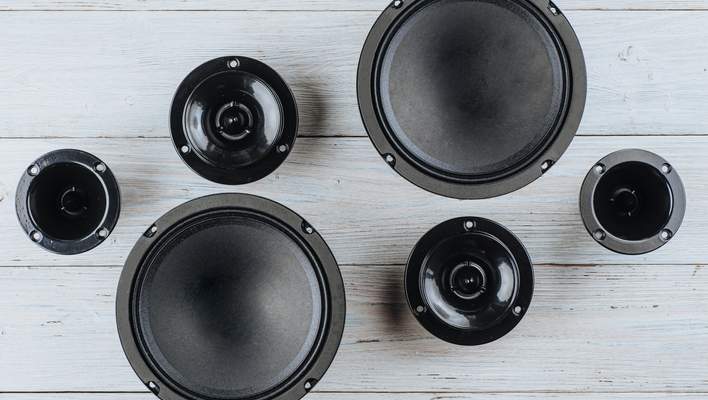Constant, high-pitched squeals from car speakers can be quite frustrating. Learn about the possible causes and how to fix the problem in a few simple steps.
Factory speakers fall victim to several issues despite the measures taken by manufacturers to boost the performance over time. A high pitched sound from stereo speakers could indicate a multitude of problems but the good news is that you don’t necessarily need an expert to find and fix it.
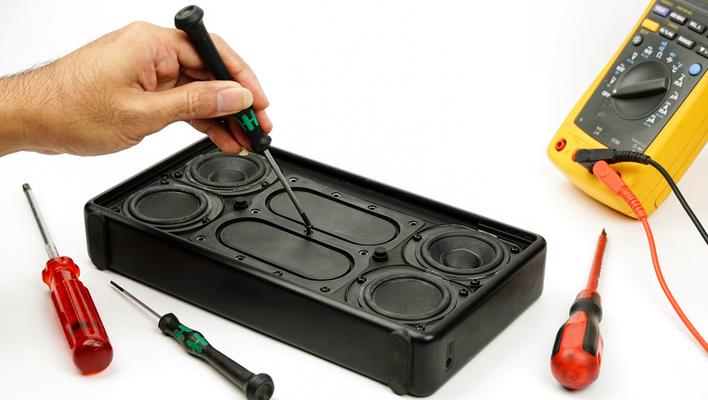
If your speakers constantly experience highly-pitched squeals, it could indicate an underlying amplifier issue, a critical grounding issue, a manufacturing error, or an electrical issue in a particular brand of speakers.
This article digs deeper into what makes your car speakers generate squealing noises and how to get rid of high pitched squeal from car speakers.
Why Do Car Speakers Generate Annoying High-Pitched Squeal?
Car speakers are the music’s life source. Unfortunately, even the best pair of speakers encounters performance issues at least once in its lifetime.
If your car speaker makes high-pitched squeals, it could be caused by an alternator whine, faulty wiring, electrical interference, damaged electrical components inside the head unit, a sudden increase in the vehicle’s rotations per minute (RPM), or other underlying electrical issue.
You can easily tell when your car speakers have high pitch sound by listening to them in action. So, why do my speakers have a high pitched noise, and how do you get rid of high pitch sound from speakers?? Here are 5 reasons why your car speakers generate an annoying squeal and how to fix it.
1. Bad Grounding – Ground Loops and Faulty Grounding Wires
Poor grounding is a major issue in car audio. Not only does it lead to amplifier malfunction, but it also causes frequent noise interferences that manifest as high-pitched squeals.
Technically, you can never get your amp to work as it should without a proper ground connection. If you try to, you may encounter additional problems such as overheating, clipping, buzzing, or damage to your amplifier.
Having a loose ground wire or a bad connection at the grounding point sends unwanted signal noise to the speakers.
Solution: Use a high-quality ground wire and fasten it firmly on the grounding point. Ensure that the ground wire makes bare contact with the grounding point by scrubbing off the paint with some steel wire. Tighten the wire using nuts and bolts, and make a strong, firm ground.
Grounding Loop
A ground loop could also be the culprit. Grounding loops occur when two or more electrical components in the same circuit are connected to the same ground at different points. A grounding loop may not necessarily damage the system, but it will cause high pitched electrical noise in car speakers.
Solution: Remove extra grounding points and use one grounding point for the system.
2. Car Audio Alternator Whine
Alternator whine is basically a grinding sound that comes out when your engine is running. As your alternator struggles to send power to all corners of your vehicle, it may introduce noise to your system.
Car audio noise mostly originates from the alternator. Car audio alternator whine occurs due to a difference in voltage between two connected points. It can also be caused by bad grounding, amp problems, crossovers, equalizers, or faulty wiring.
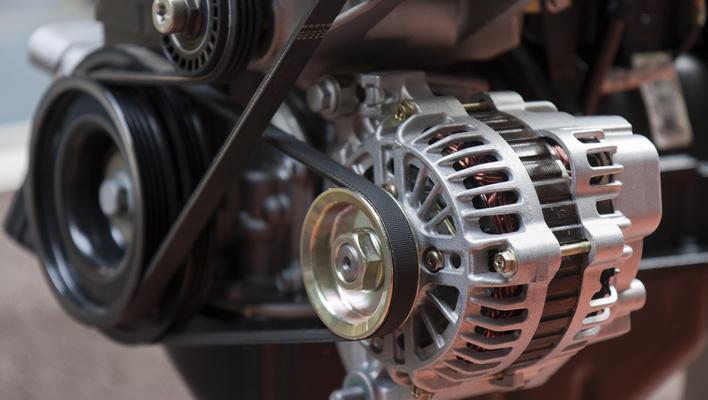
Fixing an alternator whine starts with examining the electrical wire, ground chassis, and audio wire. Check whether the head unit is firmly mounted. Troubleshoot your grounding points, and tighten all loose bolts. Does the grounding point have too much paint? Scrub off as much as possible and ensure that the vehicle’s chassis makes firm contact with the bare wire.
How Do You Get Rid Of Alternator Whine In Speakers?
Alternators may malfunction due to worn-out bearings. If that’s the case, then you need to change your alternator every once in a while. Most alternators have a service life of about 7 years, after which they start failing.
You can also try a noise suppressor. Noise suppressors are small devices equipped with heavy wiring housed in a plastic case. They are designed to tackle power line noise caused by the alternator or the voltage regulator. A noise suppressor can also protect sensitive devices from electrical spikes generated by the ignition system.
3. Electrical Noise and Electromagnetic Interference From Nearby Wires
Sometimes, an electrical interference could send a sharp noise throughout your entire system and to your speakers, leading to what engineers call ‘electrical noise.’
Electrical interference is an unwanted electrical signal that distorts the original signal. It occurs due to electrostatic coupling, radio frequency interference, direct electrical contact, or electromagnetic induction. In car audio, electrical interference occurs when your power cable is too close to your RCA cables.
Electrostatic noise can be transmitted between wires to ground, wires in a cable, or between power and signal cables. One thing you also need to watch out for is the electromagnetic interference between wires. The power line produces a strong magnetic field which affects other conductors around it.
In case your RCA cables are nearby, the magnetic flux from the power cord’s strong magnetic field cuts through the RCA cables and induces a voltage, which is interpreted as high pitched electrical noise in car speakers.
Solution: Keep your power line as far from the signal-carrying wires as possible. Use different cables to carry the audio signal and power to avoid induced voltage from reaching your speakers.
4. Bad RCA Cables and Speaker Wires
Bad RCA cables and speaker wires are also to blame for the occasional high pitched sound from stereo speakers. With high-quality, properly insulated cables behind every connection, there is less likelihood of experiencing weird noise from your car speakers.
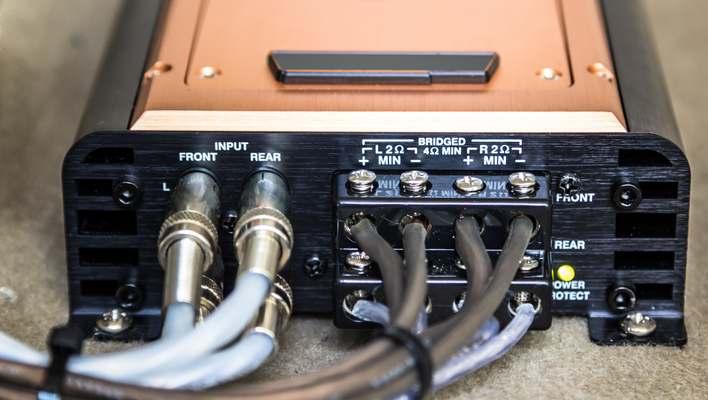
Bad quality wires often undergo premature wear and tear. Since they are made of low-quality materials, the insulation may wear off. When bare wires come into contact with live electrical equipment, they can introduce unwanted noise to the system.
Solution: Always check your wires to ensure that they don’t have torn insulation. Use good-quality speaker wires from trustworthy brands and replace your old RCA cables every once in a while.
5. Faulty Amplifier Installation
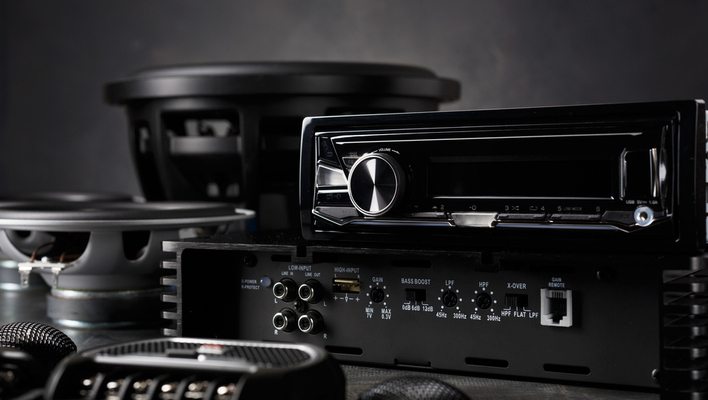
There is no doubt that amplifier problems are a leading source of all kinds of malfunctions in car audio, including car stereo making whining noise. Amplifiers produce the power needed to run speakers and massive subwoofers. However, you can expect to receive a poor signal, insufficient power, and a terrible music experience if your amplifier is not held firmly in its place.
If your amp is installed too close to a power line, it could interfere with the audio signal. Also, avoid mounting your amplifier with direct contact with the vehicle’s chassis. If both the amplifier surface and mounting point have a metal surface, they could interfere with the audio signal.
Finally, you must set the crossovers right. The wrong crossover settings can make your amplifier produce hums, hissing, and high pitched sound from stereo speakers. Once installed, test your amplifier with a multimeter, set the right gain, EQs, and use appropriate crossover settings.
How Do I Detect Whining Noise
Every piece of equipment connected to the stereo has the potential to introduce noise. Tracing the exact cause can be a challenging and time-consuming task. For instance, when the noise only comes when you’re listening to everything else but the radio, you could be dealing with engine noise or an electrical interference somewhere along the line.
If the whining persists when you’re listening to the radio only, the antenna should be the first suspect. Use an antenna noise suppressor, which can be mounted inline in between the antenna and the receiver.
Final Thoughts
Figuring how to get rid of high pitched squeal from car speakers is a skill all car owners need to master because car speaker problems can never be completely solved. Fortunately, you can make the necessary repairs with or without expert skills. If the squealing issue doesn’t go away despite trying all the solutions discussed in this article, it’s time to have a professional engineer assess the problem.

